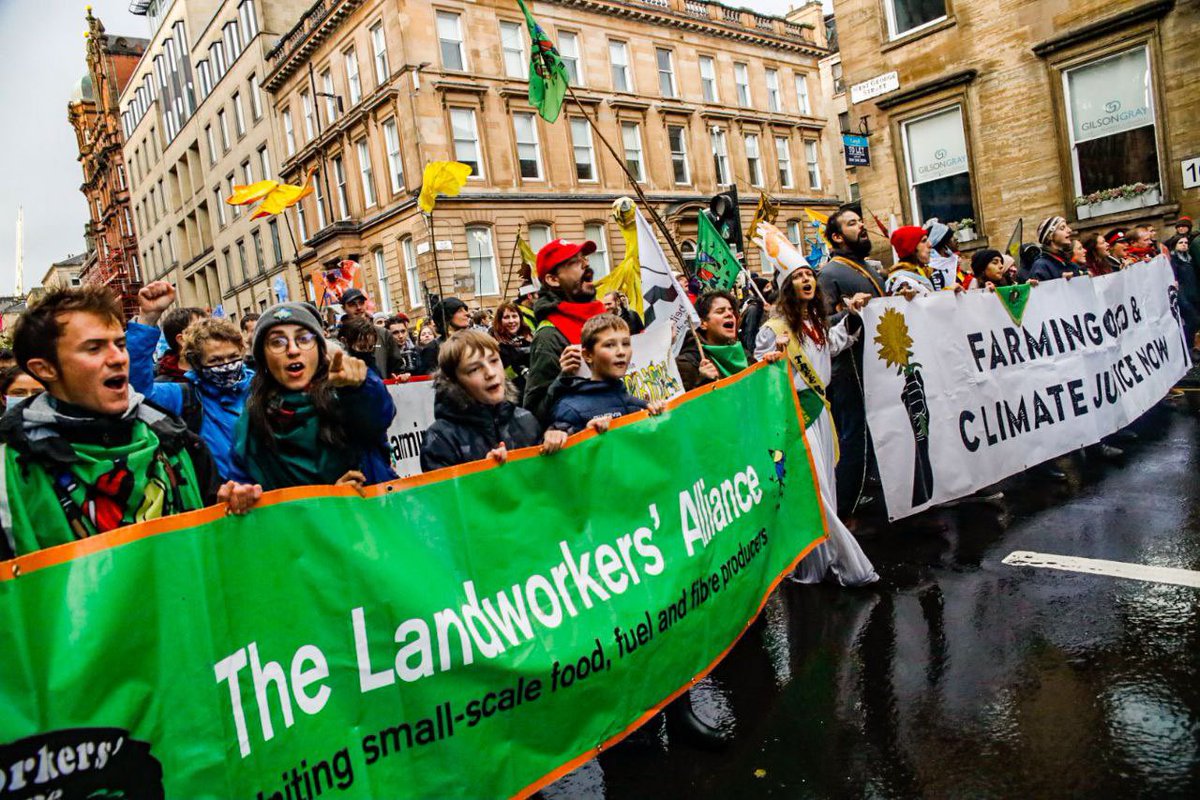The fight for more sustainable agriculture and agroecology continues at COP26

Press Release
Brussels, 10 Nov 2021
Find our PR in PDF here.
Small-scale farmers from European Coordination Via Campesina and La Via Campesina international are among those at COP 26 continuing to fight for truly sustainable agricultural systems and for the urgent process towards agroecology in the face of the industrial agricultural model promoted by large corporations and supported by many governments around the world. The event in Glasgow has resulted in pledges to reduce methane emissions and reduce deforestation. However, we must look closely at the finer details of these agreements due to the lack of confidence and firm commitments by governments to address the problem.
As a small-scale farmer organisation representing 31 organisations from across Europe, ECVC underlines the role agriculture has to play as a first line of defence for carbon mitigation. However, along with many other voices from social movements and other Civil Society Organisations, we reject the false solutions such as the proposals of “net zero” and “compensation mechanisms”.
In Europe, at present there is a huge risk that instead of being used for food production, large areas of agricultural land will instead be used as part of compensation mechanisms, notably via the forthcoming “Restoring sustainable carbon cycles” initiative announced for late 2021 (formerly called “Carbon farming Initiative”). Whilst supporting transition towards sustainable agriculture is positive, carbon credits and a carbon market will lead to the financializaton of land and even more land concentration, damaging the planet, citizens and farmers alike.
The global food system is responsible for 44-57% of global GHG emissions[1]. So, agriculture is key in the fight against climate change. However, the solutions are already on the table: peasant agroecological systems have a huge potential to absorb carbon. This is because they work with nature to protect biodiversity and the environment. We cannot keep trying to calculate how to work against nature and offset carbon with the minimum possible change of practices whilst continuing with a globally unsustainable system. World leaders must focus on providing real support for agroecology and agroforestry in order to scale them up and make the food and farming system truly sustainable from a social, economic and environmental point of view.
To achieve real change, farmers must be paid fairly for their work and citizens must be able to afford access to healthy, socially just and sustainably produced food. The only way to ensure this is by implementing market regulation that actually enables an agroecological transition and by also putting a ban on industrial intensive farming. Otherwise, the sustainable, small-scale farms that do still exist will continue to disappear, citizens will continue to pay with their health, the planet will continue to heat up and large corporations will continue to get richer and more powerful.
Many have criticised the fake solutions being peddled at COP26. As Paula Gioia, farmer and member of the ECVC Coordinating Committee, said in a speech during the COP 26 Coalition rally gathering hundreds of thousands of people that took place last Saturday in Glasgow, the overwhelming narrative of the negotiations has been “market-based solutions, risky techno-fixes and “net zero” proposals by corporate-controlled governments, transnationals, philanthropists, mainstream media and most NGOs. All feeding their climate inaction.” Dee Woods from the Landworkers’ Alliance, ECVC’s UK-based member organisation, added during an action organized by LVC delegates within the Blue Zone on 8 November:
“Several of the profit-oriented actors, who put together the UNFSS earlier this year are now pushing for initiatives like the Agriculture Innovation Mission for Climate (AIM4C) in Glasgow, which exclude those most impacted by the climate crisis, drive false solutions and undermine human rights.”
For ECVC, if compensatory measures that work against nature really had the potential to stop climate change, we would have already seen progress from the measures taken in the past. Furthermore, searching for solutions in digitalisation and new technologies is a smokescreen for industrial agriculture and large corporations in general to continue taking advantage of the planet’s resources for their own profit, whilst undermining small- and medium-scale farmers. These small-scale farmers are the ones already putting 70% of the food on our plates, whilst using only 30% of the global arable land. They have the know-how to work towards sustainability but not the resources to overcome the challenges put in place by those who wish to maintain the status quo for their own benefit.
For more information and positions from the ECVC and LVC members on the ground in Glasgow as well as more detailed political demands you can see here:
ECVC on Twitter, Landworkers’ Alliance on Twitter, La Via Campesina on Twitter
ECVC’s response to the assessment on the Restoring Carbon Cycles Initiative
ECVC press release on the Fit for 55 package
Contacts
Andoni Garcia Arriola – ECVC Coordinating Committee: +34 636 45 15 69 – ES, EUS
Paula Gioia – ECVC Coordination Committee: +49 152 05 76 45 91– DE, ES, PT, EN
Dee Woods – Member of Landworkers’ Alliance and ECVC – +44 7703 3574 43 – EN
[1] https://grain.org/article/entries/5102-food-sovereignty-five-steps-to-cool-the-planet-and-feed-its-people
This post is also available in Français.
